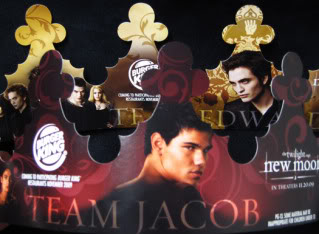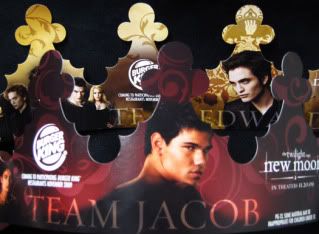
 Deconstructing Burger-Love, Instant Gratification and Black Capes
Deconstructing Burger-Love, Instant Gratification and Black Capes
I love BK bacon burgers and I’m not afraid to admit that a few Saturdays ago I indulged in some greasy afternoon convenience. And what did I notice as I walked through the door at Burger King? An ad for a teen vampire romance. I was instantly fascinated and my overactive deconstructionist tendencies kicked in. “What do burgers and vampires have in common anyway?” I thought. Don’t laugh—these are the kinds of things I mull over during the week—but I think I’ve made a few connections. Teen vampire romance and burgers have exactly two things in common: instant gratification and lingering guilt.
Carnivorous Aristocracy VS Teenaged Vampire Emo Kids: Emo Wins Every Time
Historically, the vampire myth has gotten plenty of mileage. In all of its variations, the vampire represents an alien presence that comes to feast on the innocent and pervert the natural cycles of life and death. The 18th & 19th century versions are all about bringing power to the little people. The town vampire = the blood sucking aristocracy. The emerging middle class = victim. Later, post WWI Europe had its hideous Nasferatu symbolic of rampant death and disease. Then came the handsome and suave vampire of the roaring twenties that may have been a way of dealing with sexual guilt. Then came the Anne Rice styled self-aware sad vampire. Maybe a mirror of our own socially-aware self-doubts? And while I’m all for myths shifting meaning over time, there’s something strange when a symbol is tweaked with.
What’s With That 400 Year Old Dude Doing Hanging Around Teenagers?
True to form, Twilight’s vampire is a blood sucking clarivoyant 400-year-old (in a teenage body, of course) but don’t be fooled! He’s actually an ethically aware vampire (the author, Stefanie Meyer, is a professed Mormon) that belongs to a coven that feasts on animal blood rather than human. So, you know, he’s beastly but…he’s divided, complicated and mysterious. Luckily, Twilight’s protagonist, Bella, is a complicated, misunderstood teenager. It’s a match made in heaven!
Wordly Remorse And The Self-Salvation Project
Over the last couple months I’ve been following Doug Wilson’s posts on Twilight and his insistence—a la Michael Jones—that horror fiction revolves around guilt. Here’s the big idea: The Monster is the personification of the guilty conscience that has come to bring judgment on the sinner. But the monster is a vehicle for a sort of unrepentant remorse that affords a self-salvation project in wordly sorrow. The theory is interesting and worth considering in light of the horror genre (and for death metal for that matter but that’s for another time!) but I’m not quite sure it applies to Twilight. It didn’t quite seem like the Mormon Vampirism Lite fit Wilson’s theory. In the end, Twilight seems more young adult drama with fangs and trench coats than vicarious guilt theory. But according to John Granger’s (the author of How Harry Cast His Spell) worthwhile article, there’re more than just a few Mormon theology references.
In part II of Mormon Burger I’ll discuss the Militant Authenticity Ethic and The Monster Symbol and Guilt….

COMMENTS
8 responses to “BK Vampire Mormon Burgers Part I”
Leave a Reply













It's not twisting a symbol, it's developing a genre. Like all literature, it changes with literary periods. Not clear what your definition of alien presence is, but the ancient myth is no more alien than angels or demons are. In Twilight series Edward Cullen is 100 years old. The guilt theory you spoke of works perfectly with the Twilight saga, even more so than the classic vampire tale. Yet you fail to explain why it doesn't work, except for the fact that the author is Mormon, which you make sound like an insult. My friend Jeff B sent me here. Is this supposed to be Christian themed, insulting others like you do?
*Edward Cullen is about 100 years old. I'm sure you get the point.
I remember when emo was just a subgenre of hardcore…not the territory of the faux-Marylin Manson crowd.
I feel old
Matt,
I know what you mean about the emo thing too. I too feel old.
Jimmy, this is kind of a "from a 40thousand foot view" kind of blog. I'm not hating on Twilight or Mormons and I don't think you're wrong about the developing genre thing (as granger's fabulous article points out) but there's still another post to go so…
And my mistake: Cullen is "100 years old" not "400".
Granger's analysis was completely off in left field. To hear him talk, you'd think that we Mormons were having massacre flashbacks every time we stumble across a meadow while out walking.
Truth is that the vast majority of Mormons neither know, nor care about the Mountain Meadows Massacre, and even less feel any guilt about it.
It's like claiming that all Christian authors must be putting Salem Witch Trial imagery in their books. Just a bizarre claim to make.
Adam-God is a similar defunct folk doctrine in Mormonism that almost no Mormons today even know about. I've never met anyone in my 35 years in the LDS Church who followed the doctrine. And I've probably only met a handful who even knew what it was. I seriously, seriously doubt that Meyer had any knowledge of the teaching either.
Similarly, blood atonement is not a real part of modern LDS culture and I doubt Meyer would have had it on the brain.
The Voltari = Catholics assertion was just completely out of left field. And the DNA thing didn't come from some silly genetics attack on the Book of Mormon, but rather from Meyer's research on South American legends of vampires that impregnate women.
And Granger's assertion that Mormonism started in the 1600s? I can only shake my head at such thinking.
About the only thing he did get right is the Mormon notion of theosis impacting the story. And that's about it. The rest of the theological analysis was a complete mess.
Really is interesting, thanks for bringing the mormon connection. All my mormon friends are head over hill for this series.
No problem Matt, I don't think you are purposely trying to offend anybody. I'll just point out that with all inaccuracies it leads one to believe that you haven't seen or read and Twilight, or have any knowledge of your own about how monsters have evolved through literature. It started with Frankenstein, a man made monster who wanted to be human and love but couldn't because he terrified people. Not so far off from the Twilight theme… But Twilight is what it is. I personally don't think it's that great, but I would not call it a Mormon story. The themes of strong family, fighting your personal demons, and a girl who wants to keep her baby are important to almost every religion I know of.
From a closer view it seems like the point is to laugh at "Vampire Mormon Burgers", which is a cheap laugh at the expense of people like Seth here. Do you think that that wouldn't make someone Mormon feel stupid? But, this is a formula for endless material. Jewish non-kosher cheeseburger happy meals could be for Disney films, and Christian Narnia McNuggets.
BYU-alum Stephanie Meyer could be laughing at all this. I have a feeling most of the religious themes, if present, are bouncing off of most people. They aren't as overt as the Christian Chronicles of Narnia nor the open-interpretation The Matrix were (which Granger cites as similar). Though, it wouldn't be a terrible thing if millions of teenage girls (and boys!) are inspired by Edward's wait-for-marriage morality.
I found it curious that Carisle Cullen, the Forks town doctor and the father of the Cullen coven, was a son of an (English) Anglican Priest from centuries ago. Haven't seen that fun little tidbit mentioned much. A PK-turned
"vegetarian" vampire and doctor…lets talk about those guilt issues.
I think that the Twilight Saga, having read all four books now as research working with my Youth Group, are open-ended enough that they are ripe for interpretation in various ways. Mormon avenues may be most obvious or tempting because of Meyer, but there are easy orthodox Christian allegories to be made. Blood of Christ (bite of a vampire) makes us a new creation. (spoiler alert…) The way Bella describes her new vampire body and existence in Breaking Dawn at times reminds of Paul in 1 Cor 15 describing the Resurrection. Anyway, might as well twist it our direction, like we often do with The Matrix.
Oh, and having grown up near the Olympic Peninsula, having vampires and werewolves knocking around would explain a lot.